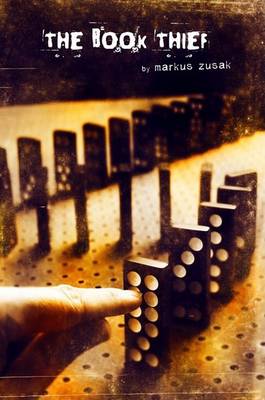Reviewed by pamela on
The story is narrated by Death and tells the tale of a young girl who steals a book from the gravesite of her younger brother. Placed with a foster family in a Bavarian country town she goes through the hardships of poverty and war while experiencing the joys of friendship and family.
I must admit I generally shy away from Holocaust literature simply because I find it such an over-used plot device. I know it seems insensitive to call it a plot device, however, more often than not it is used as just that. It seems that anyone who wants to make their literary mark feels they need to write about the Second World War in an attempt to prove they are capable of tackling ‘the big subjects’. Some writers succeed, others fail, but due to the delicate subject matter, it is often hard for reviewers to give negative comments for fear of causing offence, not only to the author but to an entire culture who have undergone such tragedy. One need only look at the Darville/Demidenko fiasco to realise this truth. That so many people lauded The Hand That Signed the Paper when it was thought to portray the real-life tragedy of a Ukranian war criminal and his family, only to eventually shun it and its author when it was discovered she had lied about her heritage, shows us how volatile the critics can be where these subjects are concerned.
Markus Zusak, rather than focusing on the negative aspects of hate, racism, and the human capacity for cruelty, places these elements in the background of a far more personal tale. Death and tragedy are all around his characters and yet, while not always rising above it, the novel still has an overwhelming sense of home; that even in the face of such tragedy a family is still able to build something beautiful.
Having Death as a narrator was a brilliant stroke. He sees the capacity of humans to kill and even though his job is to escort the dead he still places his emphasis on the lives of those he helps. That the life of one young girl is important enough for him to follow until the very end shows his, for want of a better word, humanity. He sympathises with each of the souls he takes and finds comfort in the smallest of kind actions. As a character, we don’t learn a great deal about him, but through the emotion of his narration, we learn so much about the book’s other protagonists.
Coming from a family of German heritage, with Grandparents who would have been exactly the same age as the children in The Book Thief it was interesting to read about the experiences they had. Having grown up in German culture myself, the way the novel was written and the phrasing of the German, as well as the descriptions of life in the Bavarian country town gave the entire work a ring of authenticity. Reading the novel I could almost picture my family living through the events described. The novel is so sympathetically written that an understanding of the characters has a depth I haven’t encountered in many books. We, as the readers, empathise with the situations and the childish innocence with which the events are portrayed, and it serves to show us how a world can be beautiful, even in the face of evil.
Essentially The Book Thief is about words and the power that they hold. Words are what keep people together or tear them apart; words are what gives or removes hope. Our lives revolve around words, both written and spoken. They shape our relationships. Markus Zusak is a master wordsmith, and he creates a universe that immerses us, horrifies us, makes us laugh, cry, smile, frown, while all the time showing us that even amidst tragedy a glimmer of hope and love will always exist.
Reading updates
- Started reading
- Finished reading
- 6 March, 2014: Reviewed
